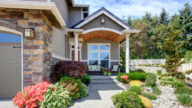Is Your Georgia Home In Need of Repairs? There Are Grants That Can Help
- Published on
- 11 min read
-
 Rachel Leigh Gross, Contributing AuthorClose
Rachel Leigh Gross, Contributing AuthorClose Rachel Leigh Gross Contributing Author
Rachel Leigh Gross Contributing AuthorRachel Leigh Gross is a freelance writer and editor based in Providence, Rhode Island. She has published content on The Balance, The Balance SMB, Thrive Global, and other smaller publications on topics ranging from personal finance and entrepreneurship to lifestyle and real estate. She has 4+ years of writing experience and holds a degree in English Literature from Brown University.
-
 Sam Dadofalza, Associate EditorClose
Sam Dadofalza, Associate EditorClose Sam Dadofalza Associate Editor
Sam Dadofalza Associate EditorSam Dadofalza is an associate editor at HomeLight, where she crafts insightful stories to guide homebuyers and sellers through the intricacies of real estate transactions. She has previously contributed to digital marketing firms and online business publications, honing her skills in creating engaging and informative content.
Many Georgia residents opt to renovate rather than relocate, keeping their beloved neighbors and convenient commutes. Making upgrades increases property value without the stress of searching in a competitive market. The challenge is cost—large projects like HVAC replacement or structural repairs can drain savings quickly, and ready cash isn’t always available. Fortunately, there are grants for home repairs in Georgia.
State and county programs can fund improvements ranging from energy‑efficient windows to accessibility modifications. If budget concerns have stalled your plans, explore how these grants can turn deferred maintenance into finished upgrades without compromising your finances.
Wanting to support its low-income and very low-income population, the state of Georgia provides several opportunities for affordable housing. This includes mortgage financing, rental assistance, and housing vouchers. Further, various programs exist at the state and county levels that support homeowners in making needed repairs to their current homes.
Home repair grant programs ensure the habitability and longevity of homes for low-income communities.
We reviewed Georgia’s top counties, federally funded programs, and the U.S. Department of Housing and Urban Development (HUD) resources to find out everything we could about repair programs for income-eligible homeowners. Read on to know more about home repair funding in Georgia.
Grants for home repairs in Georgia
Community Home Investment Program
Georgia’s Department of Community Affairs creates habitable homes through its federally funded Community Home Investment Program (CHIP). The initiative’s important distinction is that homeowners do not apply for funding. Instead, CHIP awards funds to public housing authorities, nonprofits, or government agencies that aim to improve their local communities through housing for low-income residents.
CHIP’s grants include a $500,000 limit for rehabilitation and a $1,500,000 limit for new construction. To get involved, research institutions that have received funding and be updated on new projects that take place in your community.
Community Development Block Grants
The Department of Community Affairs also offers the federally funded Community Development Block Grants (CDBG) program to support low—to moderate-income regions. Through its Annual CDBG Competition, it grants communities up to $300,000 to rehab single-activity housing projects (meaning only one kind of project per grant).
Who can apply? Small city and county governments that are not part of HUD’s metro‑city or urban‑county programs. Among these applicants, funds go first to the communities that show the highest need, measured by poverty rates and low per‑capita income, and that present plans with the biggest benefits for low‑ and moderate‑income residents.
USDA Rural Development Single Family Housing Repair Loans & Grants
USDA Rural Development supports communities across the U.S. in modernizing structures and creating updated, affordable housing through its Section 504 Home Repair Program. The program provides loans up to $40,000 at a 1% interest rate over 20 years for low-income individuals. Meanwhile, grants have a lifetime limit of up to $10,000 and are offered to homeowners aged 62 or older.
An eligible homeowner must occupy the house in a designated rural area, be unable to afford credit, and have an income that doesn’t exceed the county’s very low limit. For example, most of Georgia’s 1- to 4-person annual income limits are between $35,250 and $42,700, with the Atlanta Metro Area being an outlier at $53,750.
A homeowner can utilize the USDA Home Repair loan to modernize and improve their home, whereas the grant can only be used to remove health hazards. Applicants apply through the state’s RD office and can find support via a USDA home loan specialist. Learn more about Georgia’s USDA program here to determine if you qualify.
FHA’s 203(k) Rehabilitation Mortgage Insurance
The FHA offers the 203(k) Rehabilitation Mortgage Insurance to support the purchase or refinance and repair of a single-family home. The program insures a single, long-term, fixed or adjustable rate loan on properties at least a year old and in need of no less than $5,000 in rehabilitation, such as:
- Installing wells
- Eliminating safety hazards
- Replacing floors
- Making structural alterations
- Changing landscaping
Pay close attention to the FHA’s mortgage limits in your area, as the total value of the property cannot exceed that maximum. Georgia counties’ average limit on an FHA single-family mortgage is $524,225.
If you have a less extensive project, the FHA provides a Limited 203(k) Mortgage, financing up to $35,000 to cover improvement projects identified by an FHA appraiser or inspector.
203(k) is a convenient option that saves individuals from high interest rates, making homeownership more accessible across income levels. You’ll apply through an FHA-approved lender, and you can find the list of lenders and other program details here.
How to find county- and city-specific programs for home repair grants in Georgia
The state of Georgia works to provide safe housing for low- to moderate-income communities, primarily through its Department of Community Affairs arm. But it’s important to note that most home repair grant programs exist at the local government level. You can tap into these programs by researching your county and city government offices, and we’ve done the work for you in some of the most populated counties.
Fulton County
Located in the north-central region and covering a substantial portion of Atlanta, Fulton County is Georgia’s most populous county, with over a million inhabitants. It’s no wonder many call this beautiful region home, as it offers everything from big-city lifestyles to Appalachian Mountain escapes.
The inflated population also includes lower-income communities that Fulton County supports with community development programs. Two unique home repair initiatives in the area include:
- Department of Senior Services Minor Home Repair Program: This repair program aims to keep seniors 55+ in their homes by providing health and safety repair services at zero cost. Permissible activities include ramp and grab bar installations, structural upgrades, weatherization efforts, and landscaping.
- Community Development Minor Home Repair Program: This federally funded program provides loans or grants to low and very-low-income households to improve habitability. The assistance provided depends on what an inspection reveals and what’s needed to meet building codes or fix health and safety issues.
Chatham County
Chatham County is home to quintessential southern towns, a well-visited lighthouse museum, and a population of over 300,000 individuals. Chatham is also the fifth most populated county in Georgia and is focused on supporting lower-income communities.
Regarding repairs, Chatham’s largest city, Savannah, offers homeowners a home repair assistance program. The initiative works with eligible homeowners to make home exterior or system repairs through the distribution of grants of up to $2,000 annually and loans of up to $15,000 over a three-year period.
Funds may be utilized to purchase materials or hire contractors. Income is the predominant eligibility factor, and repairs must make the house habitable.
DeKalb County
DeKalb County is one of Georgia’s top five most populous counties, and its Community Development Department is a good resource for home assistance programs that support low-income households. It has also been granted Community Development Block Grant funds to expand suitable housing options for all income levels.
Across the county, a few programs stand out with a specific focus on supporting the elderly and disabled populations:
- Special Purpose Home Repair Program: This initiative offers forgivable loans up to $12,000 to disabled adults 21+ and senior citizens 62+ to make health and safety repairs. Homeowners must be current on income taxes, live in the home as the primary residence, and be at or below 60% area median income or AMI ($41,400 for a two-person household). Eligible repairs include roof repairs, HVAC replacements, and plumbing and electrical fixes.
- Senior Home Repair Program: DeKalb’s Habitat for Humanity offers another home repair program to support low-income seniors who are remaining at home. To be eligible, homeowners must be 65 or older, have a home 15 years or older, and meet income limits. The program features fixing plumbing, electrical, structural, and heating and cooling systems, as well as weatherization and accessibility improvements. Income-eligible, disabled individuals can also receive support through this initiative.
Glynn County
Glynn County is located on the southeast coast of Georgia, making it home to ocean lovers and the fishing industry. The county’s Community Development Department is focused on supporting development across the county through programs and grants.
The city of Brunswick has a notable home repair initiative. The local government offers an Emergency Home Repair program to applicants at or below 80% AMI who require repairs and own their homes.
The aid goes toward getting the property code‑compliant, with up to $15,000 available for minor repairs and $45,000 for major repairs across structure, roofing, plumbing, and heating. The program clarifies that the funds must be able to make the property habitable, and cosmetic changes are not permissible.
Other options for homeowners who do not qualify for home repair grants
Most home repair programs are only available for those who meet strict requirements, usually income-based, to support low- to moderate-income levels. A good average across programs is an income level at or below 80% AMI based on state and county data.
Once eligible based on income, you must also engage in only permissible home repair activities. Many programs are to be used specifically for accessibility, health, and safety repairs, not for aesthetic purposes.
If you’re ineligible based on the above criteria, you can explore other funding opportunities below to tackle your list of home upgrades.
Apply for a home equity line of credit (HELOC)
A HELOC is a revolving source of funds with a maximum available credit secured by home equity. It usually comes with variable interest rates, and the current average HELOC rate is 6.63% as of April 2025.
The first phase of a HELOC is the draw period, usually between five and ten years, during which you can draw from the available funds while making payments on only the interest. Upon completion of the draw period, you enter the repayment period, usually between 10 and 20 years, and pay off the remaining balance.
A HELOC is an excellent method when you need immediate funds for a home project, such as an emergency repair, and when you don’t qualify for income-based programs.
Consider a cash-out refinance
When undergoing a significant home project, you should consider a cash-out refinance. This replaces your current mortgage with a new one that provides the remaining funds in cash once your old mortgage has been paid off. Most lenders only offer an 80% loan-to-value ratio, i.e., the loan can only be up to 80% of the home’s value.
Let’s use an example. Say your current home’s appraised value is $200,000, and you owe $100,000 on your home. A cash-out refinance could give you a new mortgage of $160,000 (80% of the home’s value). You would pay off the old mortgage and use the remaining $60,000 for home repairs and closing costs.
A cash-out refinance isn’t for emergency repairs; you should explore a HELOC first for that. Lenders often want to see safety hazards cleared before moving forward with a refinance. There are downsides to a cash-out refinance, however. The refinance creates more debt, possibly at steeper interest rates and closing costs.
Sell your home as-is and move on!
Home repair projects come with hassles, whether planned for or surprising. You certainly create value in your current homestead, but at the expense of time, money, and emotional resources. You don’t have to tell us that seeing your contractor call you creates immediate stress.
Making repairs needs to be worth the effort, and you may decide it’s not. Maybe there is a long list of repairs, or you’d prefer to downsize. If this sounds like you, selling your home as-is might be your best option. You should first carefully review the pros and cons before making this decision, including but not limited to:
Pros of selling as is:
- Skipping repairs and leaving them to the new owner
- Attracting investors, like home flippers and instant buyers or iBuyers
- Selling more quickly than traditional processes
Cons of selling as is:
- Being perceived as a red-flag property
- Having a limited number of interested buyers
- Receiving a lower offer than expected
Selling an as-is home looks a bit different than the traditional home sale process. HomeLight’s Simple Sale is a great starting point if you decide this is how you would like to proceed. The platform makes it easy to sell your home by providing a no-obligation, all-cash offer within 24 hours and closing in as little as 10 days.
Keep Georgia on your mind with the best program for you
You have options for funding Georgia home repairs, whether they are extensive or minor projects. The state and county governments provide financial resources to keep you in your home when that’s the preferred method forward.
Grants, low-interest rate loans, or cash-out refinances mean you have ways to navigate the financial constraints of expensive projects. Do your research, use this guide, and find a program that makes the most sense in keeping you homeward-bound. Before you start any repairs, get a free home value estimate so you’ll know exactly where you stand and which fixes make the biggest financial sense.
Header Image Source: (Collov Home Design / Unsplash)








